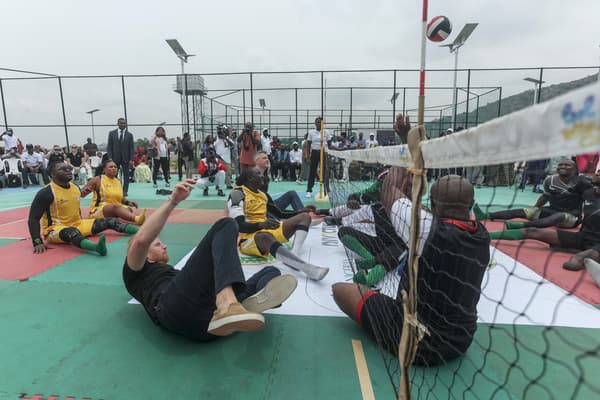Prince Harry, on a three-day visit to Nigeria, took part in a sitting volleyball match on Saturday with army veterans, often injured during the jihadist insurgency that has plagued the country for several years.
Prince Harry and his wife Meghan Markle arrived in Abuja, the capital, on Friday as part of promoting the Invictus Games, the sporting event the prince founded for war veterans.
“An honor”
At a Nigerian army compound, Harry’s team, clad in yellow, faced off against a team led by Nigeria’s chief of defense staff. Under chants of “Team Harry, Team Harry,” the prince’s team led play at the start of the match, with players sitting on foam mats, some of whom no longer have legs. But they ultimately lost 25 to 21.
On the Duke of Sussex’s team was former Nigerian soldier Peacemaker Azuegbulam, who lost a leg fighting Boko Haram in northern Nigeria, becoming the first African to win a gold medal at the Invictus Games last year in Germany.
“It is an honor for Nigeria and for Africa to welcome Prince Harry,” the latter told AFP before the match.
Invited by the Nigerian Army
Before Nigeria, Prince Harry was in London on Wednesday to mark the 10th anniversary of the games. Like all of his trips to the United Kingdom since he moved to the United States in 2020, his visit has sparked further speculation about a reconciliation with his family. But he did not know his father, King Charles.

Harry, a former Army captain who served as a helicopter pilot in Afghanistan, founded the Games in 2014. Since then, they have grown to promote the reintegration of war veterans through sport. The couple was invited to Nigeria by the Nigerian Army.
On Friday, Prince Harry and his wife Meghan visited a school in Abuja to launch an event on youth mental health, before the prince went to a military hospital in Kaduna (northwest), where he spoke to soldiers wounded in combat.
A fundraising event
The couple is expected to visit Lagos, the country’s economic capital, on Sunday to take part in two events: a basketball game and a fundraiser.
Many Nigerian soldiers have been injured in battles against jihadist groups Boko Haram and the Islamic State in West Africa (ISWAP). Since the start of the jihadist insurgency in 2009, the conflict has left more than 40,000 dead and 2 million displaced in Nigeria, and has triggered a serious humanitarian crisis, according to the UN.
In the northwestern and central states of the country, heavily armed criminal gangs, known locally as bandits, also carry out mass kidnappings for ransom and periodically attack villages from camps hidden in remote forests.
Source: BFM TV

